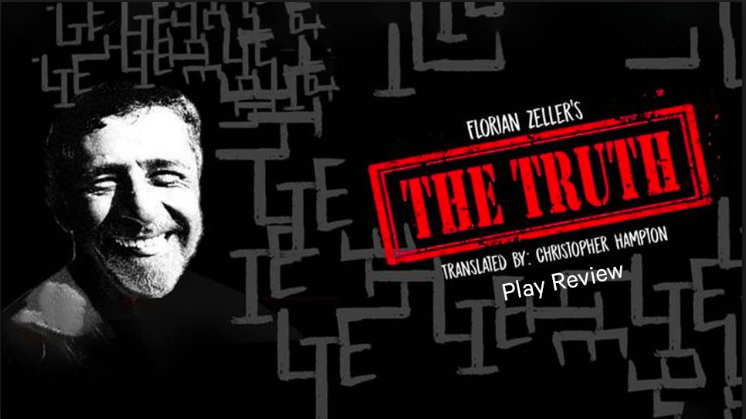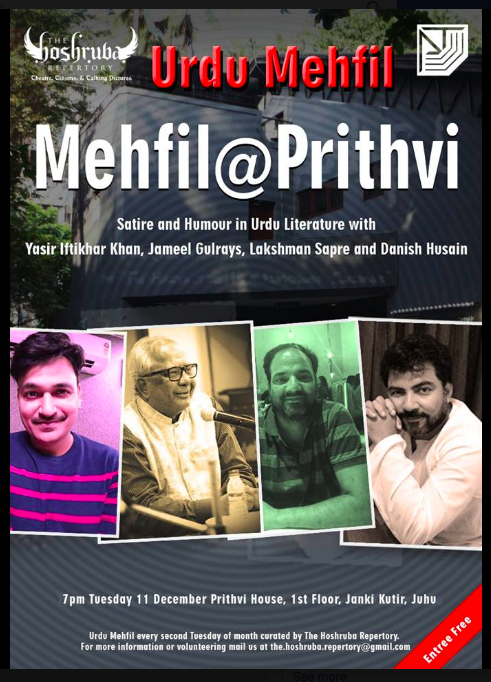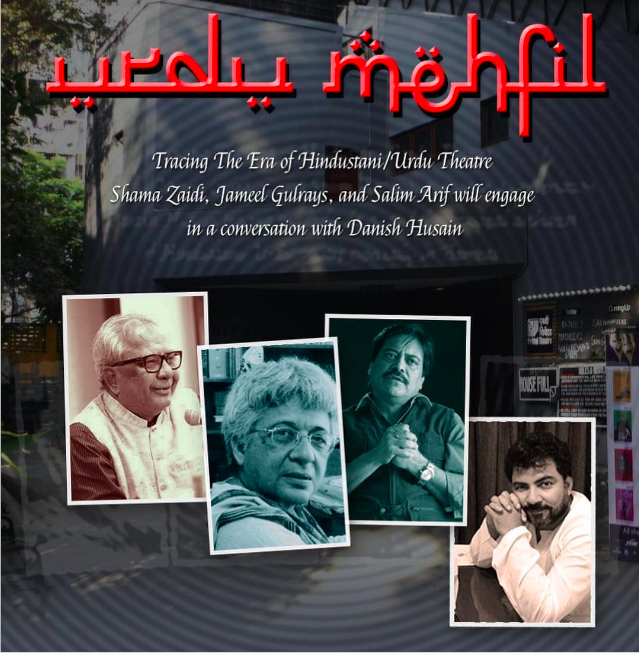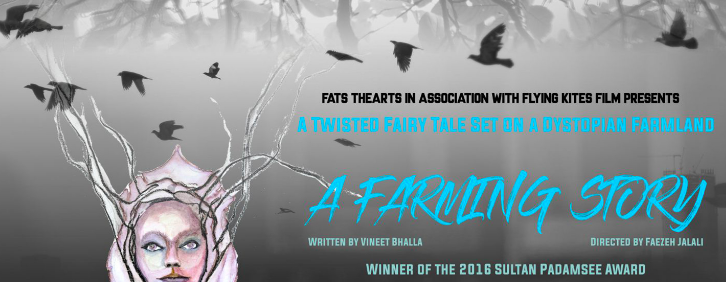|
Tuesday evening @Prithvi Theatre: Two Events Urdu Mehfil - 19:00 to 20:45 hr - a panel dialogue in English/Hindi/Hindustani/Urdu by Danish Husain's Hoshruba Repertory The Truth - 21:00 to 22:40 hr - a play in English by Naseeruddin Shah's Motley troupe Bombay à la nuit The play ended at 10:40 pm . All my attempts to get Ola/ Uber to reach D N Nagar Metro failed. It's 11 pm and me still standing on Juhu Tara road. There is no chance to get the last Karjat fast local. Finally at 11:15 pm I get a shared Ola to drop me at Ghatkopar station, but not before dropping the other shared passengers and picking up another lady from International airport. At Ghatkopar, I'm the only woman at the railway platform waiting for last Ambernath local expected at 12:28 am. It would take me another one hour to reach station .. then finding an auto-rickshaw to reach apartment. Of course, my brother remotely kept checking on me from another city via WhatsApp till I arrived home at 1:45 am. The Ola shared taxi driver - I'd kept him engaged in a discussion like any Sociologists. He was happily sharing all his frustrations about no outcome of Ola/Uber strike(s) and why lack of political empathy of Maharastra government's intervention is hurting taxi driver's problems. The Railway police (RPF) guard in his early twenties, on duty, had only me as his companion in the ladies compartment Ambernath local train. The young auto-rickshaw driver at the railway station immediately recognised me - the lady who occasionally arrives late night and gives him an extra tip - a dual rarity in a place like Ambernath. Three hours travel from Juhu to reach apartment to cuddle with Felixé Muezza, the kitten. All in all, six hours of to & fro travel for 180 min event worth it! I'd used travel time to write my quick n dirty reflection of a lovely Tuesday evening. THE TRUTH In 2017 I'd watched Motley troupe's play 'The Father' at NCPA Experimental. I can watch it again and again if Naseeruddin Shah remains the main protagonist! Le Père (The Father in french) and La Vérité (The Truth) is penned by Florian Zeller. Florian is one of France's contemporary playwrights and has also written a novel - La Fascination du Pire (The fascination of Evil) which was selected for Goulimard and created nice controversy. My French course teacher in Montepellier had asked to read this book in 2005. I have not yet read it.. Anyways, coming back to Florian Zeller the magic he creates in his playwright I think directly reflects in the success of plays. The Father brings out amazingly the world of dementia and Naseeruddin Shah did an amazing work as André, the protagonist just like his fantastic co-partner Ratna Pathak Shah played the role of his daughter. The Truth, keeps audience confounding through out 90 min performance. Once again both Naseeruddin Shah and Ratna Pathak Shah along with Shruti Vyas and Gaurav Sharma holds audience's breath spinning out emotions. I am unable to place this play into one water-tight genre - its not entirely comedy - it smoothly bring out the nuances of lies through the different meanings and contexts of what is truth and for whom. In brief, how comfortable are we with truths and human instinct to get angry with truths - this and more gets untangled in this play. The script's magic has been wonderfully turned into a beautiful performance with production design. The single set becomes diverse locales with constant change of sets and props without any glitches... credit goes to the amazing background team for creating a beautiful ambience taking audience through imaginations and into the world of protagonists. A must watch play - highly recommended. URDU MEHFIL (check out more detail about Urdu Mehfil in my November 2018 blog)
As I'd mentioned in earlier blog my knowledge of Urdu literature is next to zero. Therefore, Urdu Mehfil is an excellent place for a novice like me to fill up that gap nicely. Today's 90 mins of mehfil was the best I could've asked. Each of the panelists - Jameed Gulrays and Danish Husain, and the Urdu scholar Lakshman Sapre nicely moderated this event on satire and humour in Urdu literature. Jameed Gulrays shared the nice trajectory of how satire and humour has been introduced in Urdu literature and read out interesting pieces from Urdu poets and playwrights. Lakshman Sapre ensured that the discussion takes the shape moving between what we understand as satire and humour and its take by Urdu as a language. Danish Husain kept the humour level high and shared interesting analysis of how the term satire and humour emerges and the way famous Urdu literature scholars use humour - i.e. done by breaking a pattern of rhythmic the thinking of audience by taking them as a surprise. He narrated few dialogues of Ibn-e-Insha's play that he had adapted, directed and played 'Urdu ki akahri kitab '. Although I've seen his play but soon realised that hearing the dialogues again - I'd missed so much of the context. Another Urdu reading by Danish that touched me was Manto's essay/ take on Ashok Kumar's directorial film Aath Din (Eight days) - humour embedded in Manto's writing was so hilarious to hear. I really wish this mehfil was video and audio recorded - such a superb event that you wish to re-look and hear it again. This would be my suggestion for future events - if not streaming live at least video recording and uploading in social media would help not only to document such wonderful event(s) which other wise is inaccessible to many, but also create a better understanding of what to expect in Urdu Mehfil's monthly (second Tuesday) event. The next Urdu Mehfil i.e. Tuesday, 8th January, 2019, if I grasped correctly, will be dedicated to Fahmida Riaz (1946-2018). For those who don't her, just like I didn't knew about her.... she is regarded as a feminist progressive writer - a poet, fiction writer, but also brought new standards in Urdu literature movement. My next Culture Call picks for this month are: a) Films - 16mm Film Festival weekend - 15 and 16 December at Harkat Studio b) Dance - Madhavi Mudgal and Vaibhav Arekar - 16 December NCPA I've to drop out because I'm going for above 16 mm festival. Interested? Do get the ticket from me for free! c) Dance - Mallika Sarabhai and Geeta Chandran - 21 December at NCPA d) Play - Words have been uttered by Tamaasha Theatre - 31 December at Prithvi Theatre
0 Comments
2 reviews:'Tracing the Era of Urdu Theatre' by Danish Husain, & 'A Farming Story' by Faezeh Jalali11/13/2018 November 13, 2018 TUESDAY: After solo trekking for a week in Agonda and then travelling 14 hours in an overnight bus to reach Ambernath late afternoon with a nice back ache....... I'd little physical energy to pack my evening to travel again to and fro four hours all the way to Prithvi Theatre, Juhu. How could I've missed two back to back events! Another excitement was in sharing some of my favourite Mumbai artists with my nephew, Savyasachi Anju Prabir, who is currently in town on holidays from his Masters degree on Visual Anthropology, Media and Documentaries course in Munster, Germany. Here is a quick review of the two events from my Culture Call lens. EVENT # 1 Tracing The Era of Hindustani/Urdu Theatre Shama Zaidi, Jameel Gulrays, and Salim Arif in a conversation with Danish Husain tracing the early days, and the principal architects of Hindustani-Urdu theatre with focus on Mumbai. The speakers were not formally introduced. That probably because they are well-known personalities in theatre. Danish Husain of the Hoshruba Repertory began the Urdu Mehfil conversation by first giving the floor to Shama Zaidi - an eminent journalist, theatre and film personality. To summarise, Shama Zaidi emphasised on how Urdu theatre's origin has been influenced by Sanskrit theatre - and in turn influenced modern Indian theatre including in various other countries. Salim Arif gave a better perspective to audience about how Parsi companies found the commercial interest in Urdu language although adopted the architectural set up of the theatre from the West. Interestingly, the Hindustani-Urdu theatre did not limit to Mumbai but travelled across the country through these companies. Jameel Gulrays detailed powerpoint presentation highlighted the influence of Agha Hashar Kashmiri in Urdu-Hindi theatre, in particular Yahudi ki Ladki published around 1915 and later was adopted in Bollywood film, while his first play, Aftab-e-Muhabbat, was published in around 1890s. For an novice like me, I liked his presentation. Danish Husain facilitated the event by highlighting the historical timeline since late 17th century - taking note of influence of trade, space, theatre companies among others - that shaped Urdu theatre in India. This is my first time at Mehfil@Prithvi. My knowledge about Urdu theatre history is next to zero. Its a shame that we'd to leave after an hour to grab a quick snack before the next show. Yet, during my one hour of attendance, I felt that Danish could've moderated the first two speakers' talk - to streamline their thoughts focussed on the topic. The last part of panel discussion and conclusion that I missed makes me curious to learn more about how Urdu-Hindustani theatre personalities have adapted during the British era and the changes that occurred since then... and its impact till now - in writing as well as in performance approach. Such a powerful talk one would expect to draw a huge crowd, but less than a dozen audience in the room makes me wonder whatever happened to Mumbai's interest in such cultural events. So, if you are reading this post do spread the word and join this event every second Tuesday of the months and guess what its in bilingual (English and Hindi) and open to all and for free! Urdu Mehfil is curated by Hoshruba Repertory under the aegis of Prithvi Theatre every second Tuesday of the Month from 7pm onwards at Prithvi House, Janki Kutir, Juhu, Mumbai. EVENT # 2
A Farming Story by Faezeh Jalali Jalali's two previous plays - 07/07/07 and Shikhandi - the story of in-betweens had mesmerised me (see my previous Culture Call posts to read its review). She created a tremendous expectations from her earlier hits. One hour 40 minutes play with a ten minute break, A Farming Story, is an English play written by Vineet Bhalla. A kind of fantasy story about the current state of affairs reflecting on human beings' struggle. As the synopsis reads: A small community of farming Hummals (human animals) is struggling to survive after environmental conditions have resulted in repeated crop failures. The villagers of this community are in debt to the Estate which owns all the land. Into this world arrive Hummal monkeys, fleeing from devastating forest fires. They hope to find refuge in the village. The villagers are deeply divided about this. When a mysterious disease destroys the community's livestock, the Estate blames the monkeys, who are then, imprisoned. What ensues is a fight not only for survival, but also beliefs of compassion, bravery and wisdom.Their world eerily reflects ours, with all-powerful corporations, environmental damage, genetically modified seeds, abject poverty and mass migrations to cities. Here's my take: the actors were fabulous. The use of props and stage is just relevant and beautiful. The hairstyle and vintage props couldn't have been more apt. The fundamental challenge I think is with the script. It looked more of a film script. The first 30 min of the play just dragged and it became a long introduction without music, satire and with too much of dialogues. Some elements were not essential.. for example, the fighting sequence absolutely didn't fit in the play. I was hoping to see the magic of Jalali. It failed, although not completely. Something is missing in this play... One of the female protagonists in a wheel chair brings out an underlying Jalali's signature - gender/women dimension. I didn't find any moment in the play to laugh - though some people in the audience were laughing... it made me wondered what was I missing! With my expertise in forest land tenure and gender expert, 'A Farming Story' sounds like a perfect fit for any International Development organisations' outreach message. In other words, there was too much moral of the story and theatrical dimension got lost in the process. As such I'd recommend you to go watch it for the sake of the social equity issues - combining migration, forest fire, GMO, community land rights etc - that this play raises. Yet, this is not a direct political theatre about staging a revolution. As for theatrical experience this play could've been fit in 45 min. The script is the main culprit. Otherwise, A Farming Story is a relatively nice play even though nothing extraordinary in the storyline. Both the events - UrduMehfil@Prithvi and A Farming Story - reminds me of how theatre in India lost its 'social activism' tag, which used to be prominent in 1970 and gradually disappearing by 2000. Do read this piece 'Staging a revolution: can theatre be an effective form of activism?'.. questioning how the arts effect social change. Post two back to back events in one evening it was nice to get an opportunity to reflect while we both hogged prawn gassi with appam at Mahesh Lunch home restaurant around 11:45 pm in Juhu! That's only possible in Bombay! This post is part of Culture Call www.purabibose.com |
Privacy Policy: We use Google Analytics to collect data to improve the Website. By using and accessing the website you are consenting to use of Google Analytics. All Rights Reserved.
ARchIvES
March 2019
CATEGORIES
All
Privacy Policy: This website uses Google Analytics to improve the Website. By using and accessing the website you are consenting to use of Google Analytics.
|




 RSS Feed
RSS Feed
